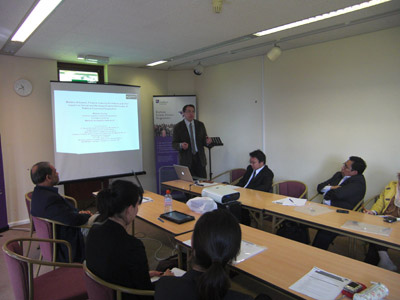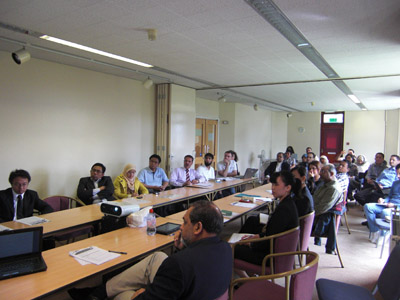
-
KIAS/ダーラム大学Durham Islamic Finance Doctoral Training Centre (SGIA&DBS)共催国際WS
(2012年7月17-18日 於ダーラム大学)
タイトル:6th Kyoto-Durham International Workshop in Islamic Economics and Finance (New Horizons in Islamic Economics) Islamic Finance & Economy and Finance in the Muslim World: Theories and Realities
日時:2012年7月17日、18日
場所:Durham Islamic Finance Doctoral Training Centre, Van Mildert College, Durham University, UK
共催:
Center for Islamic Area Studies at Kyoto University, KIAS, Japan;
Durham Islamic Finance Doctoral Training Centre (SGIA&DBS) Durham University, UK
【プログラム】
[17th July 2012]
09:30 - 09:45 Opening Remarks
Dr Mehmet Asutay
Dr Shinsuke Nagaoka
09:45 - 10:45 Session I
1.1. What is 'Islamic' in Islamic Economics?: The Technology of Social Management and its Reinstitution
Yasushi Kosugi
1.2. Models of Islamic Finance Industry Formation and Their Impact on Social and Developmentalist Outcomes
Mehmet Asutay
11:00 - 12:30 Session II
2.1. Outreach and Sustainability of Islamic Microfinance Institutions in Thailand: An Exploratory Study
Tawat Noipom
2.2. Understanding the Demand and Supply Conditions of Sharia Banking in the Case of Indonesia
Muhammad Arham
2.3. Assessing the Demand for Islamic Finance in Libya
Abdulwahab AlHajam
14:00 - 15:30 Session III
3.1. An Emerging Mode of Dispute Resolution in Islamic Finance: A Case Study in the United Arab Emirates
Ai Kawamura
3.2. Islamic Microfinance: Exploring Customer Behaviours and Perceptions Indonesia
Nur Indah Riwajanti
3.3. A Meta-Frontier Form for Measuring the Technical Efficiency and Technology Gaps of Islamic and Conventional Banks in the GCC Countries and What Factors Determine the Banks' Efficiency
Maha Alandejani
16:00 - 17:30 Session IV
4.1. Exploring the Application of Total Quality Management in the Libyan Oil and Gas Companies: Potential, Obstacles and Solutions
Musbah Saleh
4.2. Political Economy of Syrian Economic Reforms: An Examination of Legal Reforms in the Pre-Revolution of 2011
Muhammad Alsaghir
4.3. Addressing the Potential Negative Social Effects of the Privatization Programme in Libya
Hesham Shernana
17:45 - 19:15 Session V
5.1. Comparing CSR Models and Rationalising CSR in Islamic Finance
Elena Platonova
5.2. An Analysis on the Behavior of Corporate Social Responsibility towards Profitability of Islamic Banks: Comparative Analysis between Turkey and Indonesia
Akhmad Affandi Mahfudz
5.3. From Joseph's Shattered Dream to the Nightmares of the Future: Reflecting on the Financial Crisis
Anisa Maljee
[18th July 2012]
09:00 - 10:00 Session VI
6.1. Islamic Mutual Funds in the UK
Habib Ahmad
6.2. The Future of Islamic Development Theory: Endogenising the Political and the Social in Policy Making
Nazim Zaman and Hylmun Izhar
10:30 - 11:30 Session VII
7.1. Causation of Shari'ah Governance: The Discourse on the Institution of Hisbah vs. the Discourse on Islamic Finance Industry
Fawad Khaleli
7.2. Locating the Islamic Moral Economy within the Heterodox Economics: Convergence of the Economics Thinking
Alija Avdukic
7.3. Financing and Economic Development through Islamic Banking: Rhetoric vs Reality
Shafiullah Jan
12:00 - 13.30 Session VIII
8.1. Reconsidering the Economic Implication of Gharar in Islamic Derivatives
Shinsuke NAGAOKA
8.2. Consequentialism at the Core of the Islamic Law of Financial Transactions: Illustrating the Centric Role of Maqasid Al Shariah through the Mudarabah Contract
Tareq Hesham
8.3. Investigating the Element of Uncertainty in Contract Settlement: A Case Study of the Malaysian Crude Palm Oil Futures Contract Regulatory Framework
Noor Kasri
14:30 - 16:00 Session IX
9.1. Islamic Values and the Modern Territorial State: Refugees and Trans-border Mobility
Marie Sato
9.2. Giving Behaviours in Indonesia: Motives and Marketing Implications for Islamic Charities
Rahmatina A. Kasri
9.3. Comparison between Conventional and Islamic MFIs' Management Performance Using Balanced Scorecard Approach in Indonesia
Dian Masyita
16:15 - 18:15 Session X
10.1. A Study on Customer Satisfaction and Bank Selection in Interest-Free Banking Sector: Evidence from Turkey
Saduman Okumus
10.2. A Exploring the Concept of an Inclusive Islamic Financial Planning Framework, and Its Challenges in Brunei Darussalam
Hasnol Salleh
10.3. Comparative Study of Islamic and Conventional Banking in Malaysia Based on Customers' Awareness and Service Quality
Ros Aniza Mohd Shariff
10.4. Searching for the Determinants of Financing Gap in the GCC Islamic Banking
Sabri Muhammad
18.15 Closing Remarks & End of the Programme


2007年に京都大学で1回目が開かれ、毎年京都と英国ダラム大学で交互に開催されてきたイスラーム経済を主題とするワークショップは、今回で通算6回目を迎えた。今回のワークショップは、双方の大学の研究者・大学院生だけでなく、ダラム大学に滞在中の各国の研究者(トルコ、マレーシア、インドネシア)や英国内の他大学でイスラーム経済を専攻している大学院生も参加し、合計29本もの発表が2日間の期間中に報告された。
イスラーム金融の商業実践の現状が、イスラーム経済学(Islamic economics)が本来想定してきた理念と著しく乖離した形で発展してきているという問題点は、すでに過去5回のワークショップで多くの参加者に共有された点であったが、今回のワークショップでは、そのような現状の改善に対してアカデミズムがいかに貢献しうるかが多くの発表で議論された。例えば、ワークショップの開催委員の1人であるMehmet Asutay氏(ダラム大学イスラーム金融センター長)は、イスラーム金融の現状の発展の類型を3つ掲げ(湾岸型、マレーシア型、インドネシア型)、ムスリム地域社会の需要に応じた形でサービスが開発・提供されているインドネシア型のイスラーム金融が、今後のイスラーム金融の望ましい発展に対して、多くの示唆を与えているとの議論を展開した。また、Alija Avdukic氏(ダラム大学院生)は、経済学史における周縁学派の系譜を概観し、世界的にはまだ少数派であるイスラーム経済学が周縁学派を乗り越えるためにはいかなる戦略が必要かを論じ、イスラーム経済学の位置づけのあり方をめぐって活発な議論が交わされた。
このようなイスラーム金融の理念と現実をめぐる議論に加えて、今回のワークショップでも、ダラム大学のイスラーム経済研究の強みの1つとされる実証研究(イスラーム金融機関の年次報告書や質問票データを利用した計量分析)も多く報告された。これらの報告に対しては、計量分析の結果が示唆するイスラーム金融の独自性の有無や、計量分析の方法論的問題点について、多様な意見が出された。この他に、今回のワークショップでは、狭義のイスラーム経済研究、イスラーム金融研究には収まりきらないトピックも扱われた。例えば、中東諸国の企業をめぐる民営化やマネジメントの問題、中東地域の人の移動に関わる生存基盤の問題などについての研究が報告された。
イスラーム経済に関わるトピックを総体的に取り扱う学術ワークショップは、世界的にもそれほど多いわけではない。イスラーム金融研究の世界的拠点の1つであるダラム大学による本ワークショップ・シリーズへの多大なサポートや、他大学の研究者の本ワークショップへの積極的な参加は、このワークショップへの期待の大きさの表れと言える。イスラーム金融のみにどうしても注目が当たってしまう世界的潮流を考えれば、本ワークショップの重要性は今後、ますます増していくと考えられ、今後も継続的な開催が望まれよう。
(長岡慎介・京都大学大学院アジア・アフリカ地域研究研究科)
























